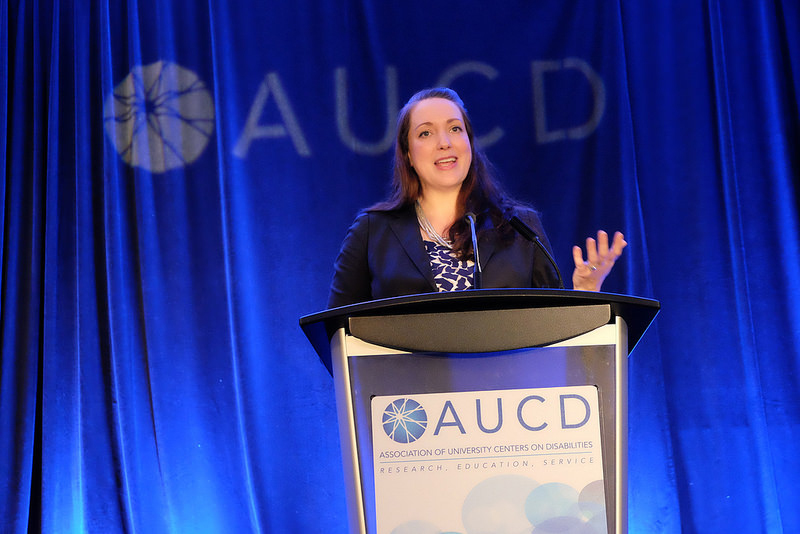
Getting ready for this week’s AUCD 2022 Conference, Kelly Nye-Lengerman (pictured at an earlier AUCD conference) beamed as she talked about joining several Institute on Disability (IOD) colleagues at the conference this year, half of whom are presenters, after a pandemic-related dip in travel.
“We have staff presenting on using statistics to understand the impact of COVID-19 on people with disabilities, including those from diverse racial and ethnic backgrounds,” said Nye-Lengerman, director of the IOD at the University of New Hampshire, part of the University Centers for Excellence in Developmental Disabilities (UCEDD) network. Previously, she was director of the Community Living and Employment focus area at the Institute on Community Integration (ICI). At the in-person and virtual conference of the Association of University Centers on Disabilities (AUCD), the IOD’s presentations will focus on including people with intellectual and developmental disabilities (IDD) in research, supporting integrated mental health practitioners working with people with IDD, and implementing Home and Community Based Services. Staff members will also participate, along with officials from the U.S. Department of Labor, in a panel discussion on apprenticeship programs and credentialing of paraprofessionals in behavioral health services.
Beginning her role leading the IOD during the pandemic was challenging, but she believes it provided an opportunity for growth.
“We came out of COVID-19 stronger, and that speaks a lot to the character of employees who were here as well as the relationships I’ve tried to cultivate,” she said. “UCEDDs are unique places for diverse research, evaluation, training, and interdisciplinary education. There are universal truths around our mission of inclusion, participation, and belonging. We’ve really pushed our thinking in the last couple of years to consider full inclusion in ways that are the most meaningful to the person.”
The organization also has provided expanded training and visibility to the broader UNH community around disability etiquette and strength in neurodiversity, helping to position disability as a critical component of UNH’s diversity, equity, and inclusion initiatives.
Under a grant from the Patient-Centered Outcomes Research Institute, IOD is evaluating the effectiveness of telehealth services on mental health outcomes for young people with IDD.
“The IOD has a strong national footprint in providing technical assistance and training in mental health for people with IDD, and a deep focus on children’s behavioral health in our state,” Nye-Lengerman said.
Danielle Mahoehney, a community living and employment specialist at ICI, said Nye-Lengerman played a tremendous role in advancing employment research, policies, and practices in Minnesota during her time at ICI.
“In addition to being a brilliant researcher and national expert on employment for people with disabilities, I think one of her greatest strengths is her ability to build relationships and make connections between people and ideas,” said Mahoehney, who Nye-Lengerman recruited. “She helped lay the groundwork for many of the partnerships between ICI and state agencies, advocacy organizations, and service providers that have become key to moving the concept of Employment First forward in Minnesota.”
Asked about a few things that stuck with her from her time at ICI, Nye-Lengerman reaches for a table decoration made for the Institute’s 30th anniversary celebration in 2015 that featured “pearls of wisdom” from ICI employees and friends. She says she often looks back on her own quote and the words of her colleagues, and she tears up as she talks about learning the value of coming from a place of curiosity instead of judgment.
“Making communities more inclusive is long-game work,” she said. “Listening is really essential and I think I really refined that skill while I was at ICI. We worked with so many people and entities outside of the organization and so we learned to strip away judgment and create opportunities to hear.”
She has used those skills to work with partners and state agencies in New Hampshire since joining IOD in June 2020 after 11 years at ICI. In addition to her role at ICI, she was a 2015 graduate of the Disability Policy and Services Certificate, and earned master’s and doctoral degrees in social work from the University of Minnesota.
“People know the IOD and what we do much better today,” she said. “A lot of that is simply picking up the phone, inviting people to engage, and not judging. Whether it’s town halls, shared events, or just behind-the-scenes strategizing, it comes down to listening and looking up and out instead of down and back.”



